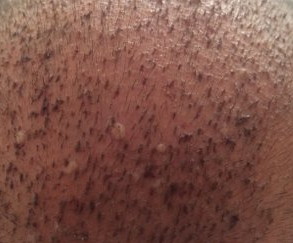This shows the value of these two medications when used in combination. The pictures tell the story.
It sounds like you are one of the 2-4% who are sexually sensitive to Finasteride. You may find that continued use will cause more problems. Speak to your doctor.
I hope that you are not under the age of 25. Men who have hair transplants at, for example, age 21 will most likely continue to bald which means that the area behind the transplant will also bald. Then, if you transplant that area at age 22, the area behind it may also go, so that will require a third hair transplant. This can continue year by year, putting you in a difficult situation. If, however, you are over age 25-26, then it gets less likely that the balding will go fast behind the hair transplant. This surgery looks good, but I am talking not about the surgery; I am talking about you and your age.
He Got a Hair Transplant in KOREA! [Part One] from tressless
That is fascinating but it prompts a few thoughts. Why not use body hair for transplant processes? And why does the balding gene only impact on the top of the head and not the sides?
The sides of the hairline, as well as the 3 inch section at the bottom of the back of the head, is immune from genetic hair loss. Body hair can be used for hair transplants but it has a short growing cycle so if you transplant 100 body hairs, only half will be growing at any one time while the others are in the telogen (sleep) phase. This means that you generally only receive half the value when body hair is transplanted compared to scalp hair.
I began taking Finasteride at around age 24 due to perceived hair loss. Due to shifting circumstances in my life, I stopped taking it around age 26. I’m now 34 years old and have seen no additional/acceleration in hair loss. What would you make of this?
I suspect that you were not balding and do not have the genes for balding.
Severe illnesses can cause hair loss. If you are not prone to genetic balding, then your hair may grow back.
In reference to this question about donor healing after FUE: https://baldingblog.com/2007/
05/09/1-year-post-op-photo-of- fue-donor-area/ How often do you see patients who don’t have white spots from the FUE? I recently got a procedure done by a doctor that promised me no white scar formation, but all I’ve read online since then is that its inevitable to get white scars. Seeing this picture of your patient gave me hope. I have fair skin and coarse hair (I’m Asian). I’m hoping to hear good news.
Scarring is the result of two things: (1) the size of the instrument used and (2) the healing properties of your scalp. Clearly, the surgeon only has control of #1.
There is a direct link between people who have crown balding and the development of heart disease. However, this is a genetic association and treating the balding will not stop the heart disease from developing. If you are worried about this, then focus on your diet, daily routines, and get a regular checkup with a doctor to make sure that the heart disease never becomes a problem. Usually, the coronary artery disease that develops in people with crown balding show up later in life.
Could Finasteride Help Prevent Heart Disease? from tressless
Women who have the same genetics as men don’t lose all of their hair in patterns because they have high estrogen levels, which protect their hair, and low testosterone. This is not rocket science. The best treatment for hair loss is to have your testicles taken off before you start losing your hair and then your hair will react to its genetic as a female would do. Very radical of course and not something I am suggesting.
We need to seriously find out why Estrogen can grow a hair full of head in a NW5 man… why aren’t scientists focusing on that? Anyone done any research on this? from tressless
https://www.technologyreview.com/s/609643/2017-was-the-year-of-gene-therapy-breakthroughs/
The Crisper technology is mainly responsible for many of these breakthroughs.
At 6 days, it is almost certainly an infection. There are some crusts that are partially removed, and they could create a point for the introduction of bacteria. This is why I am obsessed with washing the hair immediately after the surgery. I want my patients to continue doing so every day. My goal is to keep the crusts off. You should return to see your doctor and ask to be examined. If it is an infection or a folliculitis, he/she will know how to treat it.
Three links, two in the Express (a popular UK based newspaper) and a review of many medical articles from Pubmed (third link):
https://www.ncbi.nlm.nih.gov/pubmed?linkname=pubmed_pubmed&from_uid=26010505
Finasteride takes months to acquire the real benefits. The hair loss may slow or stop quickly, but its real benefits, if they occur, will take at least a year. If you are fortunate to find a doctor who has a HAIRCHECK instrument, he can report back to you what the ACTUAL benefits of the drug are on your hair between measurements (generally a year).
Your story is pretty typical from what patients tell me. Many people don’t know that they have a decreased sex drive and some even report an increased sex drive.
Page 311 of 635


